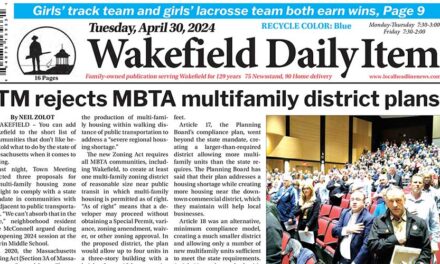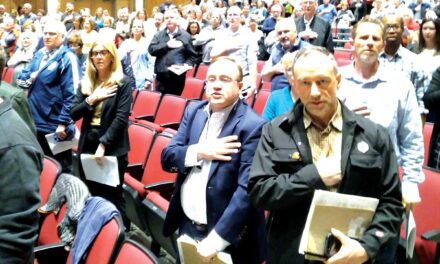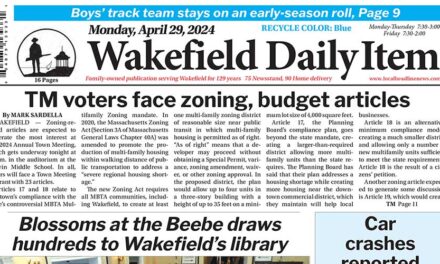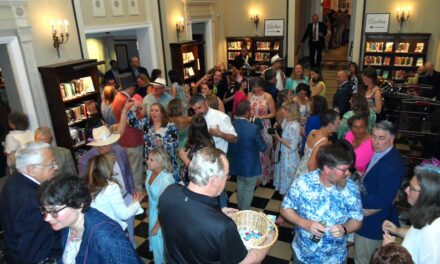Published in the November 18, 2016 edition.
By GAIL LOWE
WAKEFIELD — The Albion Arts Corridor kick-off meeting held last night inside the Galvin Middle School cafeteria brought out approximately 70 people who gave their views and opinions on what it would take to make arts and culture blossom in Wakefield’s downtown, particularly along Albion Street.
Town Administrator Stephen P. Maio opened the meeting, stating that he hoped it would be the first step in a “very exciting journey, which has the goal to develop short-term and long-term action steps to develop the downtown area” — specifically what he is calling the “Albion Street Corridor.”
Maio’s goal is to build on the thriving cultural activity along Albion Street, to develop a vision for the future of the cultural community in downtown Wakefield and to create a community-supported action plan with strategies to achieve that vision.
Discussions during 20-minute break-out sessions were held to share ideas about design and use preference, market for the arts and what a fully developed downtown might look like with a focus on arts and culture.
In one break-out session, participants were invited to help create a piece of lasting public art with the help of Joy Schilling, fine arts teacher at Wakefield Memorial High School.
A short list of what people are hoping for includes the opening of a coffee house with lots of seats, a curated/boutique wine shop, involved landlords, jazz, sidewalk improvements, a restaurant that focuses on seafood and a central place to meet people who share common interests.
Other ideas brought forward include a mural or public art, pocket parks, bicycle infrastructure and plantings.
Town Planner Paul Reavis, who also attended the meeting, requested that people contact him and Maio with opinions and comments on how best to communicate their ideas, whether through Facebook, e-mail or news outlets.
The Albion Arts Corridor is supported by a District Local Technical Assistance 2016 grant and a Planning for MetroFuture Technical Assistance grant from the Metropolitan Area Planning Council (MAPC) totaling $40,000, all made available by the Board of Selectmen entering a community compact with the Baker administration, according to Maio. Tony Longo and Paul DiNocco represented the Board of Selectmen at the meeting.
Amanda Chisholm, a Notre Dame undergraduate student and chief economic development planner for MAPC, also attended and provided a primer about her organization — that it covers 101 cities and towns in Massachusetts and that it fosters collaboration and vitality through support for arts districts.
Chisholm said there is a lot of opportunity Albion Street and called the area “funky” because it already has arts organizations, including Create, Kidcasso and Furniture Whisperer. She pointed out that Albion Street’s assets include floors above offices and stores that could be used for residential space, the MBTA commuter rail, alley ways that could be activated and interesting architectural styles.
She added that past studies show great opportunities for property owners because of the rise in real estate values as development takes place.
As part of Chisholm’s presentation, she shared a few facts concerning Wakefield’s demographics:
• In Wakefield 45 percent of the population holds a bachelor’s degree or higher.
• Median family income is $105,437.
• People in the Wakefield area spend between 12 and 18 percent more on entertainment and recreation.
• Seniors in the area tend to be generous supporters of the arts.
Also attending the meeting were MAPC staff, including Christine Madore, MAPC regional planner in charge of market study; local artists and Albion Cultural Exchange Committee members Kathy Frey, Adam Pinkney and Chris Carino.
“Tonight’s meeting is a great foundation for cementing a long-range vision and plan for arts and culture in the Albion Street Corridor and downtown Wakefield,” said Frey.
“We had a fabulous turnout tonight. I’m thrilled,” said Maio. “MAPC will take this and come back with great ideas.”
Future opportunities to connect with the project include an online survey (visit www.mapc.org/albionculturalstrategy) and an interactive public participation activity coming to the Holiday Stroll the first weekend in December.
For questions or comments about the project, contact Chisholm at 617-933-0736 or achisholm@mapc.org.




